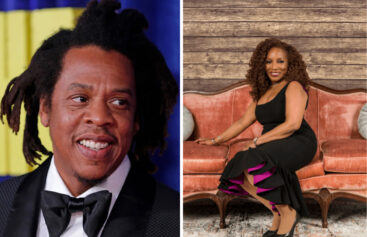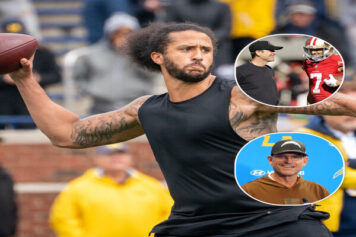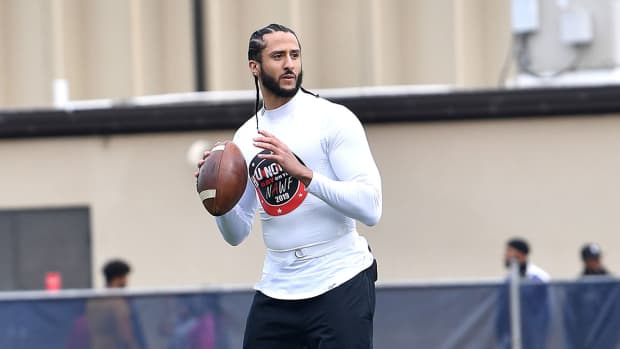Recently, The Shadow League had the chance to discuss the hot topics permeating modern society with NAACP President Derrick Johnson.
The NAACP is the oldest civil rights organization in the United States, having been founded in 1909. Currently, American society appears to be seething with far-right disdain for anything that has to do with unconditional respect for black Americans. There’s always a caveat. Always a ‘but one more thing’ when it comes to black people being treated fairly. From Charlottesville through Colin Kaepernick and beyond, Johnson went in depth regarding today’s hot topics and the NAACP’s official stance on them.
***
The Shadow League: There have been athletes who were activists in the past. Muhammad Ali most prominent among them. What do you think of the current line of activist-athletes that have been inspired by Colin Kaepernick?
Derrick Johnson: Thats an advancement for the broader community. It is a new group of individuals, but it is an old process that has been done for many years. Jack Johnson, the famous boxer, from time to time he used his platform to demonstrate his position on many issues. Of course, you mention Jim Brown, same thing, Harry Belafonte, using his platform was a huge determining factor during the civil rights movement, along with Sidney Poitier and Dick Gregory. So it is a pleasing opportunity to see many of the NFL players and NBA players but also actors and other entertainers continuously use their platforms to advance social justice particularly for African Americans.
Dear NAACP
For over one hundred years you were the pinnacle of black resistance to institutional racism in the United States of America. Since your founding in 1909, some of the most hallowed names in black civil resistance have blessed your roster. W.E.B. DuBois, Sammy Davis, Jr., Lena Horne, Ida B.
TSL: On one hand, we like to cheer black athletes for standing up for themselves, and the broader African-American community, but what of those black athletes who seem to speak counter to progressive idealism in black communities, people like Charles Barkley or even the modern, pro-Trump version of Jim Brown?
DJ: We have to celebrate their position to use their voice for social justice, but we also must protect their right to have an alternative point of view. The beautiful thing about the African American community is the fact that we are not a monolith. Sometimes the pain of being an African American is to know were not a monolith. Those things go hand in hand so therell be times were individuals who are African American take positions different than what would be considered the norm and therell be times their position, over time, would be considered the right position, SO it is for us to be patient and tolerant and inclusive of diverse opinions while at the same time maintaining a clear compass of how we should leverage our collective conscious to improve the quality of life for everyone.
undefined
undefined
TSL: The NAACP has a partnership with the NFL. How has the National Association for the Advancement of Colored People played a role helping educated NFL owners and officials, as well as helping change the narrative?
DJ: Absolutely, our partnership is with the NFL players association, the NFLPA is actually recognized we communicate regularly, just recently , we supported their truce with the NFL in terms of being neutral around the protest , we see the attacks on the right of players, ill-informed and ignorant. Many of them are kneeling out of deference and respect for the flag and the pledge allegiance as oppose to disrespecting it. But controlling the narrative is always important for us to do and as soon as individuals begin to use the activism of players to further political agenda, their goal was to control the narrative to make it to be something it is not.
TSL: Donald Trump a worse case scenario for electoral politics but black voter suppression is a favorite pastime in America. What are the steps that need to be taken to alleviate some of this?
DJ: But we have to embrace and recognize the importance of electoral politics. Elections have consequences. Racism never went away and it may never go away. But how it is tempered, how it is displayed, and how it is held accountable is completely in the hands of those who are in public office. They have to execute an accountability standard so that the public display of racism is not tolerated and harmful people are dealt with accordingly. So this midterm election is a key juncture to change the current landscape. We must do so by increasing turnouts at levels that we see in presidential elections and we could put people in office and send out the right message that the intolerance that we see, germinated from the White House is not only unacceptable, it will be held accountable.
Aunjanue Ellis: “When that Flag Waves Anywhere, We’re All Complicit!”
Last year, the terrorist act that took the lives of nine African-American churchgoers at Emmanuel AME in Charleston, South Carolina shamed the state into legislating the Confederate Flag out of state recognition, joining Virginia, Alabama, and Georgia as former Confederate States who have done so in the past.
TSL: It seems that as I get older, I see more and more signs that institutional racism has automatic protections built in, not unlike an immune system, that triggers legal levers to block any true reform. Increased voter suppression is one such lever. Police unions categorically denying racial quotas exist and the blatantly bigoted attitudes of its members is another. What’s the way around that?
DJ: We need to practice in the exercise of highlighting best practices and success and move away from the deficient mindset, it only highlights the negative. What has happened across the country as a result of Section 5 being gutted from the Voting Rights Act, were seeing many states try to revert back to voter purges.
There was a move to close voting stations (in Georgia) but because of the outcry and the potential lawsuit they decided not to do it. In terms of aggressive policing, when we elect district attorneys and place them in office and create a new accountability standard, we will see a different type of policing model because police officers are only going to be as cooperative as there are systems to hold them accountable and prosecute them when there are bad apples.
Athletes Today Have A Lot To Learn From The 1968 NYAC boycott
Fifty years ago, on February 16, 1968, Americans witnessed the power that Black athletes working in solidarity wielded. In the midst of the revolt of the Black athlete, a Black athletic revolution highlighted by Muhammad Ali’s refusal to be inducted into the military, and talks of the potential boycott of the 1968 Olympic Games in Mexico City, Black athletes across the country had started to articulate a new attitude about sports.
So across the country from California to Jacksonville Florida, to Columbus, Mississippi , and all the places in between, weve seen an increase of young activist lawyers running for the position of district attorney and in those positions theyre holding police officers and police unions accountable and so theyll see once the district attorney gets into office.
You will begin to see a sharp decrease in arrest and individuals who are being routed to the prison system and so we need to look as a community, what are mechanisms of accountability and recognize the difference between protest models and organizing models. Protest models are necessary tools in their place but they are not outcome driven, organize models, meaning we see a process through and seeing it through is focused on an outcome and make sure our communities are protected.
This year midterm elections are critically important for African Americans across the country. There are 88 legislative bodies on the ballots out of 97, state legislative spots. It is our goal to increase turn outs were asking African Americans take a pledge and vote by texting NAACP to the number 40649 so we can insure you have all the information in your local community to exercise the right to vote and encourage your neighbor to do the same.



